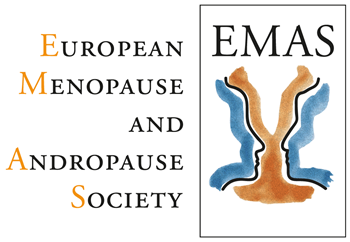Host: Welcome to today’s podcast. Midlife and bodyweight composition. This episode is part of a podcast series supported by Abbott. The content is solely the responsibility of EMAS, The European Menopause and Andropause Society. All our episodes are available in English, Spanish, Mandarin, and Russian, and you can find them on any of the most popular podcast platforms.
In today’s episode, Dr. Angelica Lindén Hirschberg, gynecologist, and professor at Karolinska Institute and Karolinska University Hospital, Stockholm, Sweden, will help us understand the effect of menopause on body weight and body composition as well as the effect of menopausal hormonal therapy on this regard.
Host: Do women gain weight at menopause?
Dr. Angelica Lindén Hirschberg: We know that most people gain weight by age, but the question is, is the specific weight gain associated with menopause? Well, actually, studies have shown that menopause per se has been associated with increases in total and abdominal fat, and this starts already a couple of years before menopause and then remains stable 1 to 2 years after menopause.
Host: Why do women gain weight at menopause and how do sex hormones affect fat distribution?
Dr. Hirschberg: Well, there could be several mechanisms behind this. Menopause is associated with reductions in energy expenditure and oxidation of fat that can predispose to weight gain, and this could be related to loss of normal luteal phase increase in progesterone which enhances energy expenditure. Another explanation could be the loss of lean mass due to decreased physical activity. And furthermore, there will be changes in fat distribution caused by the changed influence of sex hormones. And it’s well-known that estrogen promotes female fat distribution, which is an accumulation of fat below the waist and which we call the pear form. And in contrast, estrogen deficiency is associated with the accumulation of abdominal fat, the apple form, and similarly androgen excess promotes the accumulation of abdominal fat.
Host: How could women contract menopause-related weight gain and accumulation of abdominal fat?
Dr. Hirschberg: Yes, I think this is a very important question and there is evidence that combined lifestyle, dietary and physical activity prevent weight gain during the menopausal transition. And we know that exercise alone results in a dose-dependent reduction in abdominal fat. And furthermore, also prevents age-dependent loss of lean body mass. So, we could actually recommend all women have a healthy lifestyle and regular physical activity.
Host: Do women gain weight by menopause hormone therapy?
Dr. Hirschberg: This is a quite common question in the clinic. And we can surely say today that it does not, because numerous studies have shown that MHT does not result in weight gain but rather the opposite that MHT seems to counteract the visual accumulation of fat. Thank you very much for listening.
Host: Today, Dr. Angelica Lindén Hirschberg discussed the effect of menopause on body weight and body composition, as well as the effect of menopausal hormonal therapy in this regard. Thank you for listening to today’s episode. We hope it will be valuable for your clinical and research practice. Stay safe.
[END]


